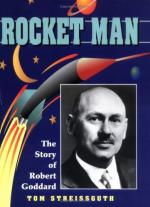|
This section contains 455 words (approx. 2 pages at 300 words per page) |

|
American Inventor and Educator 1882-1945
Robert Hutchings Goddard was born in Worcester, Massachusetts, on October 5, 1882. After reading science fiction as a boy, Goddard became excited about exploring space. He pioneered modern rocketry in the United States and founded a field of science and engineering. Goddard received a Ph.D. from Worcester Technical University in 1911 and joined the faculty at Clark University.
As a physics graduate student, Goddard conducted static tests with small solid-fuel rockets, and in 1912 he developed the mathematical theory of rocket propulsion. In 1916 the Smithsonian Institution provided funds for his work on rockets and in 1919 published his research as "A Method of Reaching Extreme Altitudes." Goddard argued that rockets could be used to explore the upper atmosphere and suggested that with a velocity of 11.18 kilometers per second (6.95 miles/second), without air resistance, an object could escape Earth's gravity and head into infinity...
|
This section contains 455 words (approx. 2 pages at 300 words per page) |

|


